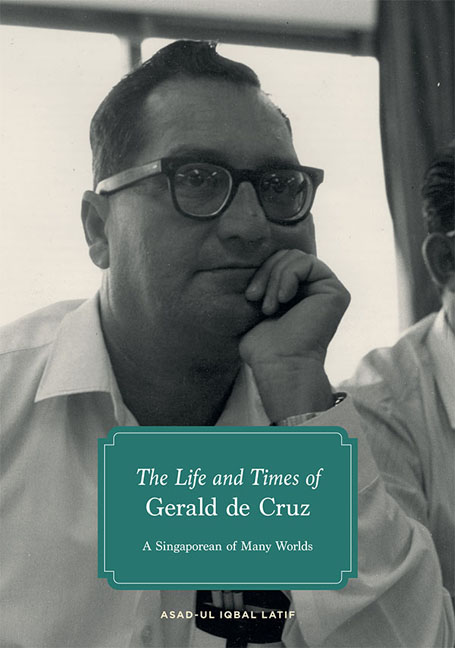Book contents
- Frontmatter
- Dedication
- Contents
- Preface
- Family Tree: Gerald Evelyn de Cruz
- 1 Don de Cruz de la Singapura
- 2 Childhood and Youth
- 3 The Japanese Occupation
- 4 The Communist Years
- 5 Going Abroad
- 6 The English Years
- 7 Return to Singapore
- 8 The Political Thinker
- 9 Friend of Labour
- 10 The Columnist
- 11 The Family Man
- Appendix
- Index
- About the Author
- Plate section
8 - The Political Thinker
Published online by Cambridge University Press: 19 May 2017
- Frontmatter
- Dedication
- Contents
- Preface
- Family Tree: Gerald Evelyn de Cruz
- 1 Don de Cruz de la Singapura
- 2 Childhood and Youth
- 3 The Japanese Occupation
- 4 The Communist Years
- 5 Going Abroad
- 6 The English Years
- 7 Return to Singapore
- 8 The Political Thinker
- 9 Friend of Labour
- 10 The Columnist
- 11 The Family Man
- Appendix
- Index
- About the Author
- Plate section
Summary
POLITICAL STUDY CENTRE
Lee Kuan Yew recalls in his memoirs that, even before the People's Action Party took office in 1959, Goh Keng Swee, Kenny Byrne and he had decided to set up a political study centre “to teach top-ranking civil servants about the communist threat and our social and economic problems. To be successful, however, we had to win their confidence and convince them they were not simply being brainwashed”.
Former History lecturer George Thomson was chosen to run the centre. He was an effective teacher “because he was full of enthusiasm for whatever he taught. He understood what we wanted and soon grasped the part he had to play.” Thomson chose de Cruz as his assistant. Lee opened the centre, situated in a colonial government bungalow in Goodwood Hill, on 15 August 1959. Its objectives, he told civil servants, were not only to “stimulate your minds but also to inform you of the acute problems that confront any popularly elected government in a revolutionary situation.… Once these problems have been posed to you, you will be better able to help us work out the solutions to them, by making the administration more sensitive and responsive to the needs and mood of the people.” In a message published in the first edition of Bakti, the centre's journal, Goh elaborated on this point. “The Civil Servant participates in the democratic state by contributing his skill and experience in running the administrative machinery. He can hardly hope to be an effective administrator if he is unaware of the political milieu in which he must operate or if he is unsympathetic to the long-term objectives which the government sets out to achieve.” Lee and some of his ministers visited the centre themselves, discussing situations that had to be dealt with immediately.
In his Oral History Interview, de Cruz speaks of Thomson as “a marvellous Scotsman who came out here with Mountbatten's forces, became our first Director of Public Relations, identified himself with the aspirations of the new Singapore and became trusted by every Singapore government — the British Government, [the] David Marshall Government and [the] Lee Kuan Yew Government.
- Type
- Chapter
- Information
- The Life and Times of Gerald de CruzA Singaporean of Many Worlds, pp. 116 - 166Publisher: ISEAS–Yusof Ishak InstitutePrint publication year: 2015

